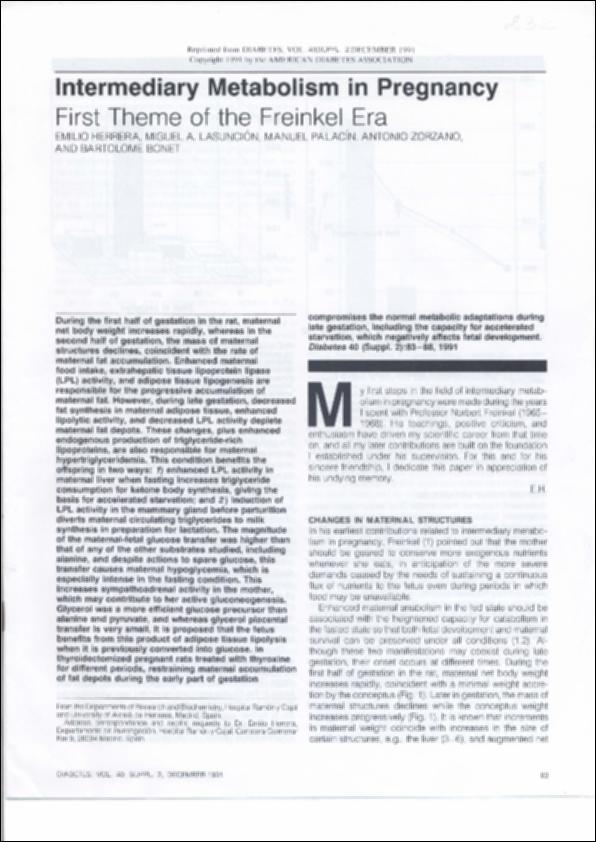Por favor, use este identificador para citar o enlazar este ítem:
http://hdl.handle.net/10637/789Intermediary metabolism in pregnancy : first theme of the Freinkel era.
| Título : | Intermediary metabolism in pregnancy : first theme of the Freinkel era. |
| Autor : | Herrera Castillón, Emilio. Lasunción, Miguel Ángel. Palacín, Manuel Zorzano, Antonio Bonet Serra, Bartolomé |
| Resumen : | During the first half of gestation in the rat, maternal net body weight increases rapidly, whereas in the second half of gestation, the mass of maternal structures declines, coincident with the rate of maternal fat accumulation. Enhanced maternal food intake, extrahepatic tissue lipoprotein lipase (LPL) activity, and adipose tissue lipogenesis are responsible for the progressive accumulation of maternal fat. However, during late gestation, decreased fat synthesis in maternal adipose tissue, enhanced lipolytic activity, and decreased LPL activity deplete maternal fat depots. These changes, plus enhanced endogenous production of triglyceride-rich lipoproteins, are also responsible for maternal hypertriglyceridemia. This condition benefits the offspring in two ways: 1) enhanced LPL activity in maternal liver when fasting increases triglyceride consumption for ketone body synthesis, giving the basis for accelerated starvation; and 2) induction of LPL activity in the mammary gland before parturition diverts maternal circulating triglycerides to milk synthesis in preparation for lactation. The magnitude of the maternal-fetal glucose transfer was higher than that of any of the other substrates studied, including alanine, and despite actions to spare glucose, this transfer causes maternal hypoglycemia, which is especially intense in the fasting condition. This increases sympathoadrenal activity in the mother, which may contribute to her active gluconeogenesis. Glycerol was a more efficient glucose precursor than alanine and pyruvate, and whereas glycerol placental transfer is very small, it is proposed that the fetus benefits from this product of adipose tissue lipolysis when it is previously converted into glucose. In thyroidectomized pregnant rats treated with thyroxine for different periods, restraining maternal accumulation of fat depots during the early part of gestation compromises the normal metabolic adaptations during late gestation, including the capacity for accelerated starvation, which negatively affects fetal development. |
| Descripción : | En: Diabetes. 1991. n. 40, pp 83-88 supl. 2. ISSN 0012-1797 |
| URI : | http://hdl.handle.net/10637/789 |
| Derechos: | http://creativecommons.org/licenses/by-nc-nd/4.0/deed.es |
| Fecha de publicación : | 19-sep-1991 |
| Centro : | Universidad San Pablo-CEU |
| Aparece en las colecciones: | Facultad de Farmacia |
Los ítems de DSpace están protegidos por copyright, con todos los derechos reservados, a menos que se indique lo contrario.


